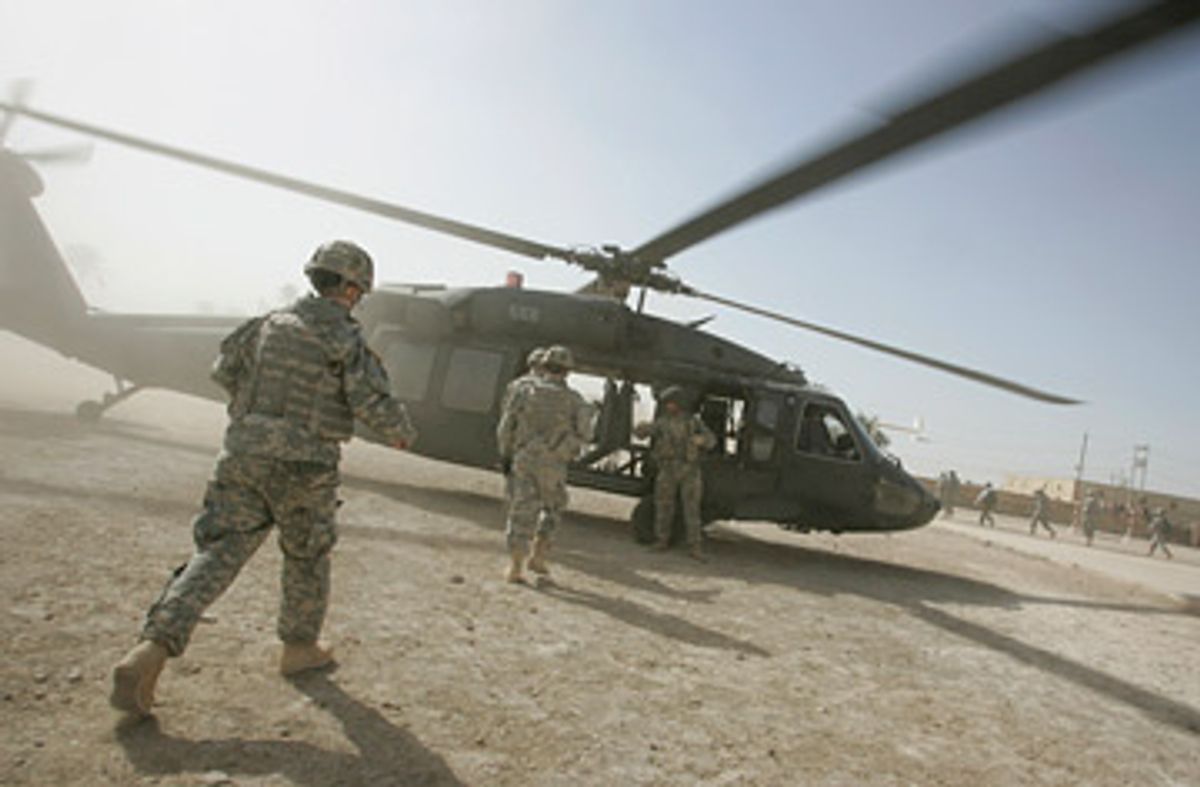May 6
Military travel is often frustrating. I was supposed to leave the Green Zone on a Black Hawk flight bound for Forward Operating Base Falcon, just across the Tigris River. It was supposed to be a 10-minute flight, but instead the helicopter was in the air for almost half an hour and then landed in Camp Taji, a sprawling desert U.S. military base outside the city. The crew told all passengers to get off. It was hazy, there was a chance of a sandstorm and the crew decided it wasn't safe to fly. We were stuck in Taji's spartan helicopter terminal -- a few wooden benches nailed together under a makeshift awning -- and it was unclear when we were going to fly.
Sgt. Brian Carman was stuck, too. He had a black bruise under his right eye from a sniper bullet that entered his face during a fight with the Shiite Mahdi army in Sadr City two weeks ago. His left cheek, where the bullet came out, was swollen. The front of his flak jacket was splattered with brown blotches of his own dried blood. He had been waiting for two days for a helicopter to take him to Baghdad International Airport, where he would catch a plane to Kuwait, and from there, another plane home to Missouri. He was going on home leave for 14 days. Then he was going to return to Sadr City to fight the Mahdi army again.
"Good thing they didn't ship me out when they were supposed to" (immediately after his injury), Carman said, slurring his speech. His cheek has not healed yet, and he was taking a lot of painkillers. "My face was huge."
Sgt. Carman was there with two other soldiers from his unit. They chain-smoked cigarettes and talked about what they were going to do when they got home. A medic, who said he had patched up 130 casualties between March 25, when the fighting broke out, and April 30, when he left Sadr City, was going to buy a big bottle of Jameson's whiskey and drink it by himself. Another soldier was going to drink German beer and golf. Sgt. Carman said he was going fishing.
They talked about the fighting in Sadr City in terse, clipped sentences.
"It was real quiet, not a shot, and then it just erupted in one day," Carman said.
"They're fighting, but we're pushing them back," said the medic.
"We've definitely got the upper hand," Carman agreed.
Then the soldiers talked about what they would do when their deployment ends in August. The medic said he might become a military recruiter. The other soldier said he was getting out of the Army as soon as his contract was up. Sgt. Carman said he will stay in.
"After this, it's tough not to come back. Civilian life just doesn't work out," he said. This is his fourth deployment to Iraq since the war began.
Finally, the soldiers' ride arrived. They hoisted their dusty backpacks, fastened the straps of their Kevlar helmets, and walked, stooping slightly under the weight of their packs, along a gravel strip to the landing pad.
They never got on the helicopter. A colonel needed to go to the airport, and they were ordered to give up their seats for the officer.
"Outranked," Carman spat out, as he got to the terminal.
It was past noon, and the haze was gone. The scorching sun was almost directly above the soldiers' heads.
"Fuck it," Carman said, to no one in particular. He turned his back on the landing pad and went into Camp Taji, away from the terminal. "I'm going to sleep."
"Like a punch in the gut," the medic said. "The guy just got shot in the face in Sadr City, and he gets bumped off the flight. Don't get me wrong, I love my job. But there are some people that just don't get it."
A half-hour later, the medic got on a flight to the airport, at last. There was room for Carman, too, but he was asleep in his tent.

Shares